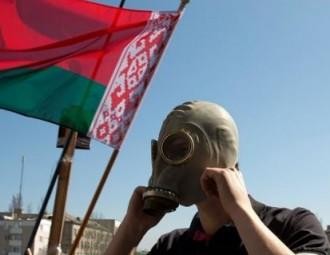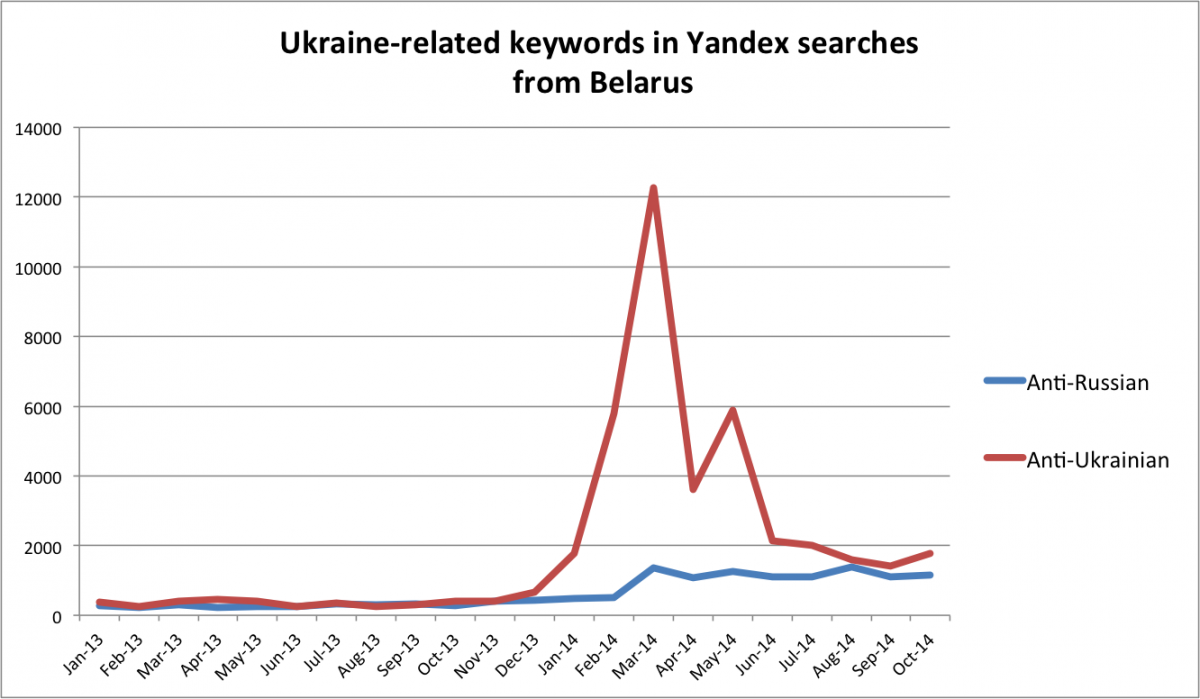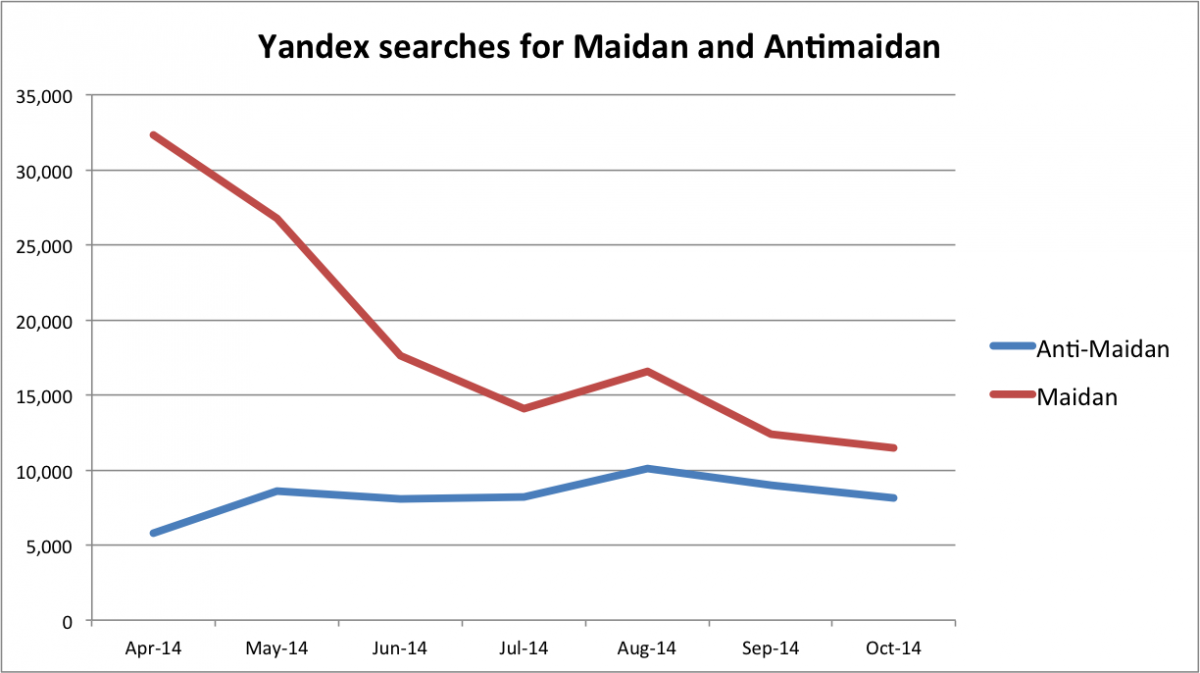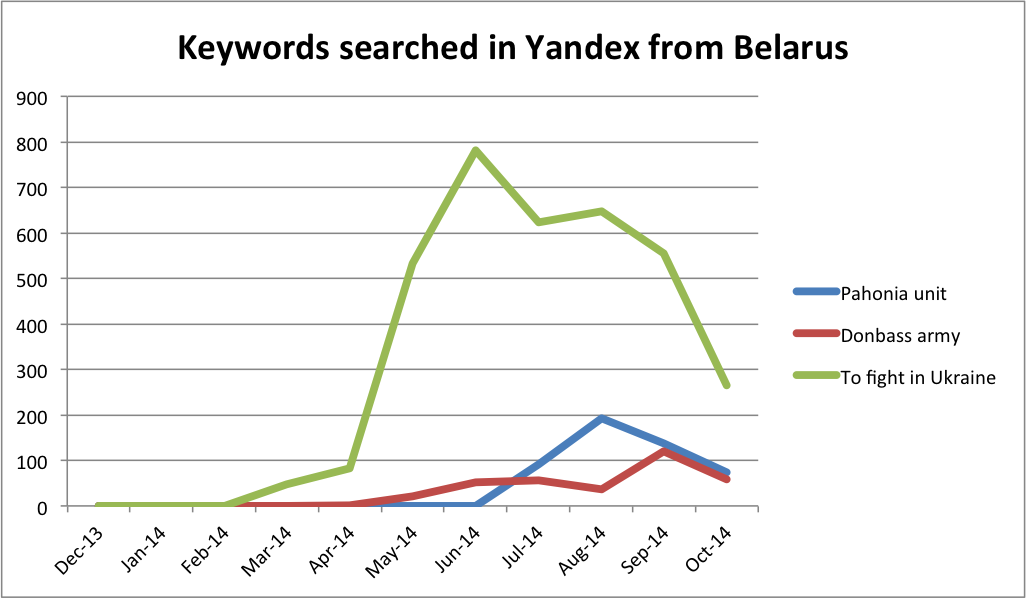Opinion: In the short run the state benefits from the growing ideological polarization on Ukraine

However, in the long run, radicalisation of Belarusan society and possible return of Belarusans now fighting in Ukraine on both sides of the conflict may weaken the stability of the Belarusan regime.
The Ukrainian conflict has exposed growing ideological differences among Belarusans.
When Volha Krapotsina was distributing anti-Russian leaflets in Hrodna, a fellow citizen, who empathised with the Russian side, reported her to the police. In Minsk, while some distributed stickers “We support the recognition of Novorossiya” others vandalised cars with Russian licence plates.
Belarusans clash in the social media, take their views to the streets, and even travel to fight in Ukraine.
At the time when the war in Ukraine divides Belarusans, patriotic initiatives that avoid accentuating ideological differences hold great importance.
Seeking freedom and a fun New Year’s
The first stream of Belarusans crossed into Ukraine to cheer for the Euromaidan in late November 2013. Politicians, activists, and ordinary citizens waved the white-red-white flags, banned by the Lukashenka regime and used as the symbol of the Belarusan opposition.
“People were driven by a desire to feel free... to participate in the making of independence, even if not of their own country,” Valiancin Tsishko of Maladzechna told Belarus Digest. Tsishko left Kiev a day before the outbreak of violence on 19 January.
“It is vital for me to protect the aspirations of those who are close to me in spirit and support people’s desire for freedom and liberty,” Dzianis Ivashyn, a civic activist from Hrodna who regularly visits Ukraine, said. “Besides, I have both Belarusan and Ukrainian roots. Ukraine and Belarus are my motherlands.”
Some Belarusans arrived in Kiev simply to celebrate the New Year and have fun with friends. Happy Tours (Vitsebsk) advertised a two-night “New Year on the Maidan” in December 2013. Priced at $180, the trip included a walking tour of Kiev, a night on the Maidan, and a visit to Kyiv Pechersk Lavra.
Ideological struggles at home and abroad
Before the conflict turned violent, every firth Belarusan viewed it in the positive light, according to IISEPS March 2014 analysis. After the bloodshed, however, people began taking sides.
Monthly keyword trends provided by the search engine Yandex, popular in Belarus, illustrate this dynamic. Anti-Ukrainian queries spiked in searches from the Belarusan territory in February-March 2014. The popularity of phrases such as "Banderovtsy" and "Ukrainian fascists" shows just how much Russian propaganda affects Belarusans' views.

Anti-Ukrainian keywords: Ukrainian + fascists, nationalists, Nazism, "Banderovtsy." Anti-Russian keywords: Russian + fascists, occupiers, imperialism; "Vatniki", "Putler", "Maskali."
“Who owns Crimea” has become a marker for establishing and maintaining interpersonal contacts and communities,” said Alyaksandra Dynko, a Belarusan journalist who visited Kiev as the conflict unfolded. Two uncompromising views have emerged. Support for Ukrainian territorial integrity, as well as the mainstream and far right groups fighting toward this aim, predominates among the Belarusan opposition.
Many political activists see the war as a noble fight against Russian imperialism. Youth organisation Malady Front openly supports the decision of some Belarusans to fight against the pro-Russian separatists. On its web site, the organisation went as far as to celebrate the Ukrainian Insurgent Army (UPA), which in 1943-1944 not only sought Ukraine's independence but also killed nearly 100,000 Poles in Volyn and eastern Galicia.
Pro-Russian sympathies remain popular among the masses, however. Ultranationalist groups such as the Russian National Unity have successfully recruited Belarusans to fight on the side of the separatists.
Some Belarusans have joined the initiatives with self-explanatory names such as Anti-Maidan and Orange Hunters. The identity of Belarusans who chose rally behind the pro-Russian initiatives may surprise some.

Yandex searches for keywords "Maidan" and "AntiMaidan" from the Belarusan territory.
For example, the organiser of AntiMaidan's VKontakte group is the 18-year-old son of Dzmitry Us, who served a prison term after running for president in 2010 and participating in post-election protests in Minsk. Reacting to the revelation about his son, Us told Radio Svoboda in October that the Anti-Maidan protest plans in are "nonsensical and delirious."
As IISEPS surveys of public opinion demonstrate, the Belarusan population is about evenly divided on the ideological dimension. In the October 2014 poll, 25% of respondents said they would take up arms to protect Belarus were Russia to use force and seek annexation. When the question was instead posed about the NATO threat, an identical proportion (25%) said they would take up arms against the Western military block. In each case, only 40% of respondents said they would try to adapt to the situation.
Ideological disagreement is everyday life
Strong convictions on both sides create friction, which further polarises the population.
In October, Evgeny Novikov’s program "Human Rights - a look into the world" disappeared from the Belarusan state TV channel "Belarus 24." According to Novikov’s blog, his attitude toward the situation in Ukraine that is “ruled by banderovtsy and neonazi” was to blame. The government views such an attitude as far too radical.
The authorities also punish the overzealous supporters of the Ukrainian side. For example, the police did not allow the displays of the Ukrainian flag at the November 21 concert of Ukrainian band Okean Elzy.
Belarusans also increasingly resort to vigilante tactics that belie their support for one or the other side in the conflict.

Yandex searches for keywords "Russian National Unity," "Restruct," and "Format-18."
In September, Hrodna’s Volha Krapotsina placed leaflets reading "Return the Crimea! Hands off Ukraine" and "Shame to the traitor who holds the tricolor flag. Putin will shake your hand as he is picking you up on a bayonet" on the windshields of cars with Russian numbers.
Not the police, but a fellow Belarusan - who clearly held the opposite view of Russia - detained Krapotsina. The man said he paid respect to the local policeman who had earlier solicited his help. On 18 November, Krapotsina received both a $400 fine and an outpouring of support from Belarusans who shared her convictions.
The diverging perceptions of Belarusan Mihal Zhyzneuski, one of the first victims of the January clashes between Maidan protesters and the police, prove that heroes for some are fascists for others.
Zhyzneuski's participation in Maidan resulted in a posthumous order of the Heavenly Hundred Heroes (Geroj Niabesnaj Sotni) award and a memorial at the site of his death in Kiev. Yet at home In Homel some people call him “a bandit and fascist,” his mother said.
Who benefits from the radicalised masses?
In the long run, radicalisation of the Belarusan society as well as the possible return of the Belarusans now fighting in Ukraine on both sides of the conflict might weaken the stability of the Belarusan regime.
In the short run, however, the government stands to benefit from the growing ideological polarisation. It could win supporters among moderate voters reacting against the ultranationalist views of either the pro-Ukrainian or the pro-Russian sides.
In this context, all the more important become civic initiatives such as distributing Belarusan vyshyvankas (embroideries with national elements) and singing Belarusan folk songs. Such initiatives can bring people together around independent Belarus without accentuating their ideological differences.
Alyaksandra Dynko views these initiatives as the society’s attempt at self-preservation. The authorities’ moderate support for such initiatives indicates that the regime may also like to stem radicalisation and contain the fringe elements, she said.
Originally published at BelarusDigest
-
03.01
-
07.10
-
22.09
-
17.08
-
12.08
-
30.09








































